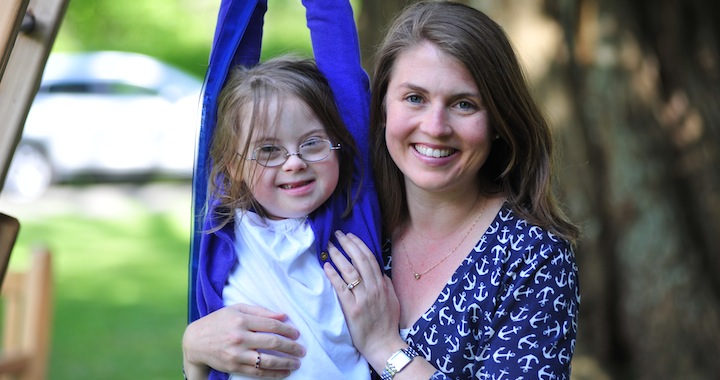Today we’re chatting with 7 ½ year-old Penny Becker and her mom, Amy Julia Becker. In Becker’s memoir, Good and Perfect Gift—selected by Publisher’s Weekly as one of the top 10 religion books of 2011—readers journey with her from the shock of discovering her newborn daughter has Down syndrome into unforeseen joy.
RLC: Penny, what can you tell us about Down syndrome?
Penny B: Down syndrome is . . . flexible. Makes you flexible.
AJB: Kids with Down syndrome have low muscle tone, which makes them very flexible.
RLC: That’s cool. Is there anything that’s a challenge about it? Hard?
Penny: Not really.
AJB: Maybe like having to get tubes in your ears?
Penny: Yeah, and the Emergency Room.
RLC: And, Penny, what can you tell me about Jesus?
Penny: Jesus is a man. And he is good. And very gentle to people.
RLC: Thanks, Penny. Amy Julia, will you say something about how Jesus interacted with people with disabilities?
AJB: Perhaps the most radical example Jesus gives us when it comes to his treatment of people with disabilities is how it parallels his treatment of everyone else. Just as he treats Nicodemus, the religious ruler, and the adulteress woman at the well with equal respect, curiosity, and a willingness to speak truth, he treats people with disabilities with the same attitude as he has towards able-bodied people. He refuses to objectify the “man born blind” in John 9. If we understand Jesus’ attitude towards people in general, we understand his attitude towards people with disabilities because he doesn’t put them in a separate category of human being.
With that said, we don’t have any obvious examples of Jesus interacting with anyone with an intellectual disability. We have examples of mental illness that follow the pattern I describe above, so I think we can assume he would have treated people with ID in a similar friendly, respectful, honest and compassionate manner.
RLC: Good point. Penny, do you think there is anything that makes you different than kids who don’t have Down syndrome?
Penny: Caroline?
AJB: You mean you’re different from your friend Caroline? What makes you different from Caroline.
Penny B: Caroline has blonde hair.
RLC: Amy Julia, as Penny’s mama, give us a peek into your experience. Any heartbreaks?
AJB: I often worry that she won’t be included socially only to have her, for example, come home with a purple rhinestone studded wallet that a little boy in school gave her as a present because he likes her so much.
My heart does break, however, when I write about Down syndrome. Most women with a prenatal diagnosis of Down syndrome abort, and most people in our culture support this decision without a second thought. When I try to advocate for the value of the particular lives of people with intellectual disabilities, I tend to receive a host of comments that demonstrate how little our culture values them.
Last week on the Red Carpet: Rachel Held Evans
RLC: What are your greatest joys?
My greatest joys with Penny are the joys any parent experiences—watching her dance in the kitchen with her siblings, listening as she reads me a book, cheering for her as she works hard to learn how to swim or play tennis or add and subtract.
RLC: So, I’ve got to ask. If you could take away the extra chromosome that caused Penny’s Down syndrome, would you? Why or why not?
AJB: I wouldn’t. As far as I can tell, Down syndrome is intrinsic to who Penny is. It creates challenges for her—she wears glasses and has trouble understanding number concepts and she can’t run as fast as other kids her age. I can’t articulate the blessings it brings in quite as specific a list, though I suspect that her generous spirit and her lack of competition has something to do with her extra chromosome. But I can say that Down syndrome contributes to her wholeness as much as it contributes to her brokenness. I’ll leave it to God to heal the brokenness in all of us.
With that said, when medical advances enable specific negative aspects of Down syndrome to be overcome, Penny and we will consider them and potentially embrace them. I would embrace medical assistance for my other kids if they needed it, but I wouldn’t embrace an opportunity to change their genetic code.
 RLC: In the 1st century, people with disabilities were considered afflicted by God because of their sin. Is there a more Christian theology of disability?
RLC: In the 1st century, people with disabilities were considered afflicted by God because of their sin. Is there a more Christian theology of disability?
AJB: Again, the story of the man born blind in John 9 is helpful here. The disciples assume that either the man or his parents had sinned, and that this sin resulted in his blindness. Jesus says point blank that this perspective is wrong, though it is a theological position that has cropped up within the church and society throughout the ages. Now people are more inclined to understand disability as a manifestation of Sin in creation rather than as a result of a specific sin.
Either way, however, people with disabilities often become marginalized, as if they are more broken or needy than the rest of us. In recent years Hans Reinders, Amos Yong, Stanley Hauerwas, Jean Vanier, among others, have been articulating a more nuanced Christian understanding of disability.
RLC: Let’s bring it home, where we live. Here’s a scenario: “There’s a young man who grew up in my church, who has Down Syndrome. I feel awkward and uncomfortable and have no idea how to have a conversation with him. Help!”
AJB: First, I’d consider why you feel awkward and uncomfortable. But second (and perhaps this will help overcome the awkwardness and discomfort), I’d go back to WWJD. Jesus would talk with a person with Down syndrome in the same way he would talk with anyone else—by asking an initial question and then basing the next question upon the response to the first. I guess my advice comes down to patience and trust. If you believe that a person with Down syndrome has the capacity for a real relationship, and if you believe that you have something to give to and receive from that person, then friendship can happen. It might just take some time.
RLC: Penny, if there was someone at your school in a wheelchair, what would you want to ask them?
Penny: I would want to ask did you break your leg? Did you have a phone?
AJB: Why?
Penny: I just thought if someone was in a wheelchair they would need to have a phone in the wheelchair with them.
AJB: That might help them, is that what you were thinking?
Penny: Yeah.
AJB: Good idea.

